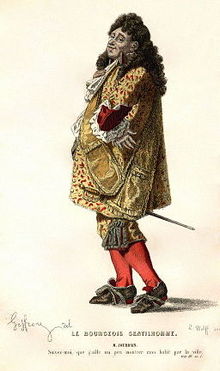This is an old revision of this page, as edited by Petercrapsody69 (talk | contribs) at 15:42, 18 June 2007. The present address (URL) is a permanent link to this revision, which may differ significantly from the current revision.
Revision as of 15:42, 18 June 2007 by Petercrapsody69 (talk | contribs)(diff) ← Previous revision | Latest revision (diff) | Newer revision → (diff)- For the meanings of the acronym FOP, see FOP (disambiguation).
The fop is a stock character who appears from time to time in fiction. He is a person who makes a habit of fastidiously overdressing and putting on airs, aspiring to be viewed as an aristocrat. In English, the word fop is older, but the meaning of an overdressed, frivolously fastidious man may not be; Shakespeare's King Lear contains the word, in the general sense of a fool, and before him, Thomas Nashe, in Summer's Last Will and Testament (1592, printed 1600): "the Idiot, our Playmaker. He, like a Fop & an Ass must be making himself a public laughing-stock." Osric in Hamlet has a great deal of the fop's affected manner, and much of the plot of Twelfth Night revolves around tricking the puritan Malvolio into dressing as a fop.

One of the first full-blown appearances of the stereotype on the stage is Molière's well known play from 1671, Le Bourgeois Gentilhomme. This play takes for granted the social structure of France at the time. Its central premise concerns M. Jourdain, a bourgeois, a member of the middle class, attempting to remake himself as an aristocrat and a "gentleman". The play's comedy comes from the title character's ridiculous overdressing, and clueless statements. One famous passage has Le Bourgeois Gentilhomme expressing surprise that he has been speaking prose all his life, unawares.
Additionally, the fop makes his appearance in The Relapse, a Restoration comedy from 1696 by John Vanbrugh. Vanbrugh planned The Relapse around particular actors at Drury Lane, writing their stage habits, public reputations, and personal relationships into the text. One such actor was Colley Cibber himself, who played the luxuriant fop Lord Foppington in The Relapse.
In the first decade of the twentieth century, fictional heroes began to pose as fops in order to conceal their true activities. Sir Percy Blakeney of The Scarlet Pimpernel is a well known example of this tendency; Sir Percy cultivates the image of being an overdressed and ineffectual social butterfly, the last person anyone would imagine being capable of dashing heroism. A similar image is cultivated by Zorro's secret identity, Don Diego de la Vega. This continued with the pulp fiction and radio heroes of the 1920s and 30s and expanded with the coming of comic books. The fashion and socializing aspects of being a fop are present in some interpretations of Batman's second identity Bruce Wayne. These became clichéd.
A more recent and minor trend is "fop-rock", in which the performers don eighteenth century wigs, lace cravats, and similar costumes to perform, a minor movement that would appear to owe something to glam rock, visual kei, and the New Romantic movement. Adam Ant of Adam and the Ants would seem to be a forerunner of the trend, who occasionally performed in elaborate highwayman outfits. Other notable examples would be Falco's performance as Wolfgang Amadeus Mozart in the song Rock Me Amadeus, a #1 hit in the U.S. and the UK in 1986, and Boston-based band The Upper Crust.
In the 2000 film O Brother, Where Art Thou? the character Everett McGill, a prison escapee who fancies himself a dandy, is upset when he cannot purchase "Dapper Dan" brand hair-pomade because only "Fop" brand is available.
References
| This article does not cite any sources. Please help improve this article by adding citations to reliable sources. Unsourced material may be challenged and removed. Find sources: "Fop" – news · newspapers · books · scholar · JSTOR (November 2006) (Learn how and when to remove this message) |